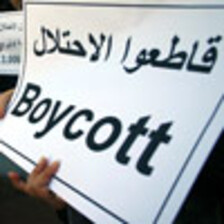The Electronic Intifada 12 November 2010
The major Dutch pension fund Pensioenfonds Zorg en Welzijn (PFZW), which has investments totaling 97 billion euros, has informed The Electronic Intifada that it has divested from almost all the Israeli companies in its portfolio.
PGGM, the manager of the major Dutch pension fund PFZW, has adopted a new guideline for socially responsible investment in companies which operate in conflict zones.
In addition, PFZM has also entered into discussions with Motorola, Veolia and Alstom to raise its concerns about human rights issues. All three companies have actively supported and profited from Israel’s occupation of the West Bank (including East Jerusalem) and the Gaza Strip.
Over the past few years, activists in the Netherlands have questioned the two largest pension funds PFZW and ABP about their holdings in companies profiting from the Israeli occupation of Palestine. In September 2009, the Norwegian State Pension Fund decided that it would no longer invest in companies that directly contribute to violations of international humanitarian law. By February 2010, ABP, the largest Dutch pension fund, informed The Electronic Intifada it had also divested from the Israeli company Elbit Systems. At the same time, PFZW confirmed that it held shares in Elbit Systems worth 1.6 million euros.
However, the pension fund was reevaluating its investments in Israeli companies. At the time, PFZW held shares in thirteen Israeli companies, including four banks, several telecommunication companies, construction companies and Elbit Systems. In November 2009, PGGM informed The Electronic Intifada that the fund would approach divestment decisions on “Bank Hapoalim, Bank Leumi and other [Israeli] companies” in a structural manner. This was based on a “new policy on how to deal with investments in companies in the Israeli-Palestinian conflict.” That month, PGGM announced that PFZW was divesting from Africa-Israel for “technical reasons.” Owned by Lev Leviev, Africa-Israel has been involved in the building of illegal settlements in the occupied West Bank.
On 8 November, PGGM spokeswoman Diana Abrahams confirmed in a telephone conversation PFZW’s divestment from almost all Israeli companies. Abrahams could give no further details and referred to PFZW’s 2010 annual report, which will be published next year.
During this period, PGGM has also contributed to the development of guidelines for the United Nations Global Compact. The Global Compact is a strategic policy initiative for businesses that are committed to sustainability and responsible business practices which started in 2000. The initiative is endorsed by chief executives and seeks to align their operations and strategies with ten universally-accepted principles in the areas of human rights, labor, environment and anti-corruption. Last year PGGM was involved in developing a guideline for business operations in combat zones.
The decision by the Dutch pension funds to divest from Israeli companies is yet another indicator for the success of the international boycott, divestment and sanctions campaign. It is likely only a matter of time before these funds and others divest from the international corporations which profit from Israel’s occupation.
Adri Nieuwhof is a consultant and human rights advocate based in Switzerland.
Guus Hoelen, secretary of Werkgroep Keerpunt, involved in divestment campaigns in the Netherlands.





